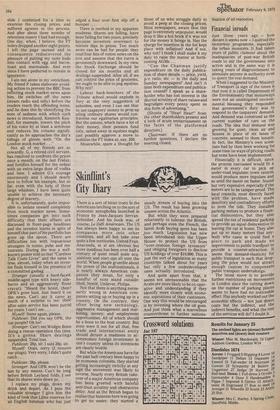Financial inroads
Just three years ago — how distant it seerns now — I queried the motorway programme, especially the urban monsters. It had taken years of public clamour about the inadequacies of post-war British. roads to stir the government into action and in the same way it is taking years of disgruntlement to stimulate anyone in authority even to query the real demand.
When I suggested to the Ministry of Transport (a sign of the times is that now it is called Department of the Environment) that motorways were not an unmitigated environmental blessing they responded that government's duty was to respond to the taxpayers' demand. And demand was construed as the current number of cars on the roads. The idea that demand was growing for quiet, clean air and houses in place of six lanes of concrete, seemed to them lunatic. In fact, the Ministry's own scientists had by then been working for some time on ways of pricing roads, but none have been implemented.
Financially it is difficult, since the process canvassed would fit a meter in every car to pick up under-road impulses; town centres would produce more impulses and so send the meter on faster. Sound but very expensive, especially if the meters are to be tamper-proof. The local councils, most directly faced with the problem, have made desultory and contradictory efforts to stem the tide. They installed parking meters to produce a financial disincentive, but they also spread the net of residents' parking to provide an equal disincentive to leaving the car at home. They also put up so many meters that anybody who came in could find a place to park and made no improvement to public trangport to provide a counter-attraction. It seems that demand-elasticity for public transport is such that dropping the price would not attract enough custom to compensate public transport undertakings. The latest move is to provide further restrictions on movements in London since the cutting down on the number of parking places seems to have had no noticeable effect. Has anybody worked out the economic effects — not just direct costs but the indirect, and the indirect benefits, and what the rest of the services will do? I doubt it.


































 Previous page
Previous page